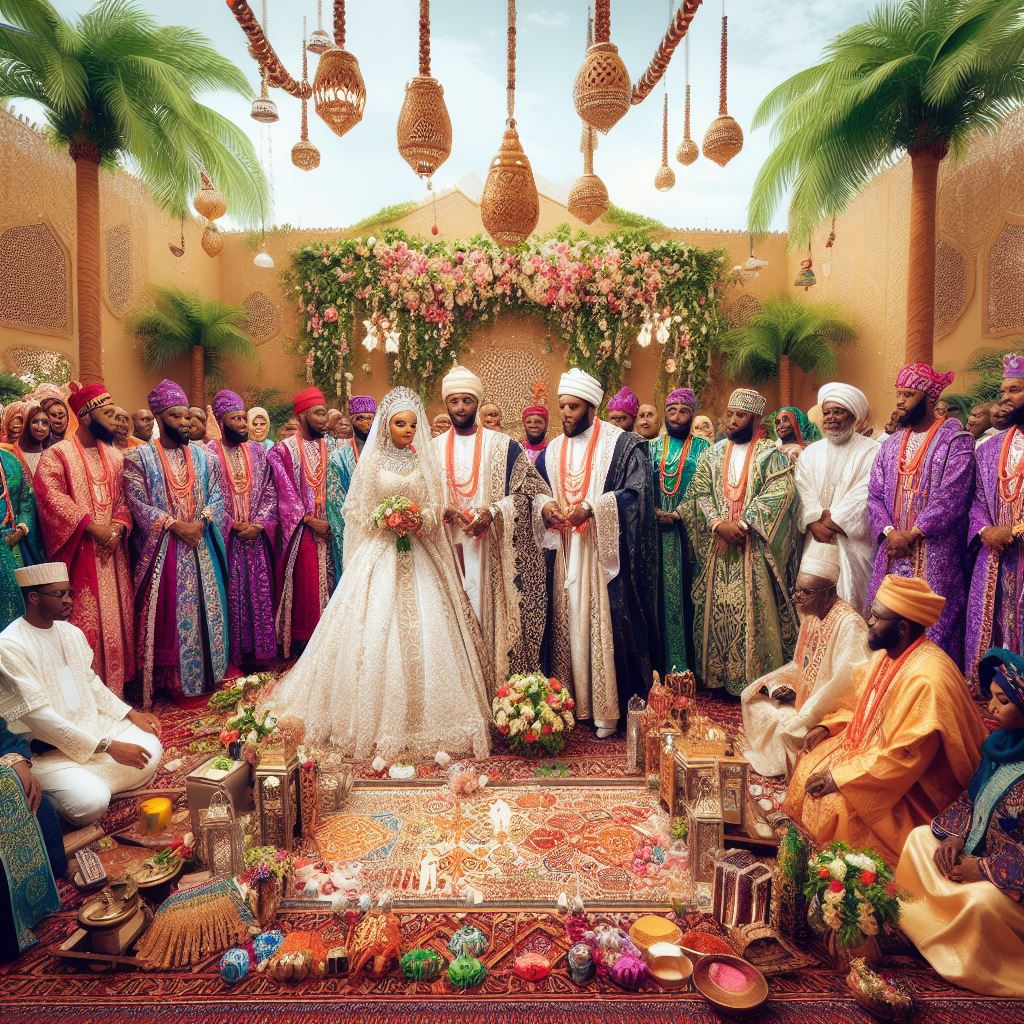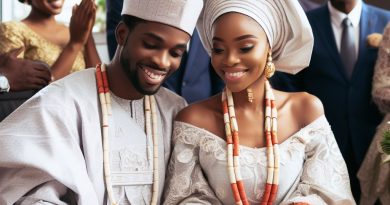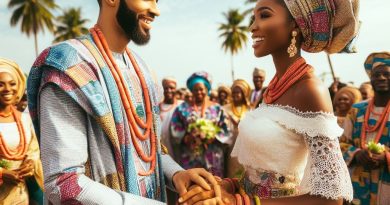Choosing a Spouse in Islam: Criteria and Nigerian Context
Last Updated on October 16, 2023
Introduction
Choosing a life partner in Islam is a momentous step.
It transcends mere companionship; it’s a spiritual bond. The criteria for selecting a spouse in Islam are deeply rooted in faith, love, and shared values.
In Nigeria, a nation where tradition and faith blend harmoniously, choosing a spouse holds unique characteristics.
Nigeria boasts a rich tapestry of cultures, religions, and ethnicities. Islam thrives among a vast Muslim population.
This diverse backdrop influences the approach to finding a life partner.
Here, interfaith unions are common, and the compatibility of religious beliefs becomes a paramount concern.
The coexistence of Christians, Muslims, and adherents of indigenous religions shapes the dynamics of spouse selection.
Furthermore, the importance of family in Nigeria is undeniable.
Marital choices often extend beyond the couple themselves; they involve families and communities.
The role of the extended family in these decisions cannot be understated.
In this series, we will delve into the criteria laid out by Islamic principles for choosing a spouse and how they intersect with the vibrant Nigerian context.
From faith compatibility to cultural considerations, we will explore the intricate facets of this profound decision in the heart of Africa’s most populous nation.
Read: Celebrating Walimah: The Sunnah of Islamic Wedding Feast
Understanding the Criteria for Choosing a Spouse in Islam
The importance of spiritual compatibility
- Alignment of Religious Beliefs: In Islam, finding a spouse means ensuring your religious beliefs are in sync. A harmonious relationship requires shared faith, allowing both partners to grow spiritually together.
- Significance of Shared Values: Shared values and goals are like the foundation of a strong building. They provide the basis for mutual respect, understanding, and shared objectives in life.
The role of character and moral values
- Emphasizing Honesty: Honesty forms the cornerstone of a good character. It is vital for building trust and maintaining a healthy, lasting relationship.
- Integrity and Piety: Integrity goes hand in hand with piety. A spouse with a strong moral compass brings blessings to the family and is guided by ethics in all endeavors.
- Good Manners and Behavior: Good manners create a respectful atmosphere at home. Politeness and consideration for one another ensure a harmonious household.
Consideration of family background and compatibility
- Evaluating Family Dynamics: Family dynamics play a crucial role in future relationships. It’s essential to assess how your partner’s family operates and how that might impact your life together.
- Inter-Familial Relationships: When families are compatible, it can lead to a supportive network. However, there might be challenges, so prepare for open communication and understanding.
In the Nigerian context, these criteria are particularly relevant. Islam places a high value on family life, and selecting a spouse who aligns with your faith and values ensures a strong foundation for a happy and prosperous marriage.
Read: The Quran on Marriage: Key Verses for Nigerian Muslims
Criteria for Choosing a Spouse in the Nigerian Context
Significance of Culture and Traditions
- Culture’s Influence on Expectations and Roles in Marriage: Culture profoundly shapes the expectations and roles of individuals within a marital relationship.
- Balancing Cultural Practices with Islamic Teachings: It’s crucial to harmonize cultural practices with Islamic principles to ensure a spiritually sound union.
The Role of Financial Stability and Socioeconomic Factors
- Evaluating Financial Compatibility in Marriage: Assess your financial compatibility – shared financial goals and budgeting – for a stable, stress-free marriage.
- Navigating Societal Pressures and Expectations Related to Wealth: Be mindful of societal pressures around wealth and remember that contentment transcends material possessions.
Consideration of Education and Career Aspirations
- Assessing Compatibility in Terms of Intellectual Pursuits: Evaluate your intellectual compatibility; shared interests can enrich your relationship and conversations.
- The Importance of Supporting Personal Growth: Encourage each other’s educational and career aspirations; support personal growth within the marriage.
In Nigerian culture, as in many other parts of the world, the selection of a life partner is a decision of profound significance.
Culture, finance, and education play pivotal roles in shaping this choice.
Cultural norms guide our expectations and roles within marriage, but it’s vital to balance these with the teachings of Islam to build a spiritually enriching union.
Financial stability and socioeconomic factors must not be ignored.
Assess your financial compatibility, and remain cautious of societal pressures surrounding wealth; remember, contentment goes beyond material possessions.
Furthermore, intellectual compatibility should not be underestimated.
Shared interests and encouragement of each other’s educational and career aspirations can lead to a fulfilling, growth-oriented partnership.
In the Nigerian context, these criteria form a significant part of the decision-making process when choosing a spouse, and when wisely considered, can lead to a harmonious and prosperous marriage.
Read: Understanding Talaq: Divorce Laws in Islam for Nigerians

Challenges and Pitfalls in Choosing a Spouse in Islam
The danger of superficial criteria and materialistic values
- Caution against prioritizing looks and material possessions: In the quest for a life partner, it’s vital to avoid the trap of superficiality. A person’s beauty or wealth, while enticing, should not overshadow their character.
- The significance of focusing on inner qualities and character: Islam emphasizes character over appearance. Seek qualities like kindness, honesty, and piety. These inner attributes form the foundation of a strong marriage.
Addressing cultural pressures and societal expectations
- Overcoming societal pressure to conform to certain standards: Nigerian society often exerts pressure on individuals to conform to certain marital expectations. It’s crucial to remember that Islamic values take precedence.
- Balancing individual preferences with societal norms: Striking a balance between personal preferences and societal norms can be challenging. Make decisions that align with your faith while respecting your culture.
Dealing with conflicting family opinions and expectations
- Approaching disagreements respectfully and with empathy: Families may have differing opinions on your choice of spouse. Approach these discussions with respect and empathy, emphasizing the Islamic principles guiding your decision.
- The need for open communication and negotiation: Open dialogue is key. Communicate your thoughts, listen to your family’s concerns, and work towards solutions that honor your faith and maintain family harmony.
Basically, choosing a spouse in Islam, particularly in the Nigerian context, is a journey filled with challenges.
By focusing on inner qualities, balancing societal and personal expectations, and maintaining open communication, you can navigate these challenges while staying true to your faith.
Read: Islamic Marital Counseling in Nigeria: Benefits & Places
Conclusion
Importance of Choosing a Spouse in Islam
Choosing a spouse in Islam is a pivotal decision that shapes one’s life profoundly.
It is not merely about companionship but a path to spiritual growth and fulfillment.
When a spouse aligns with your faith and values, it fosters a harmonious, loving environment.
Such unity strengthens your connection with Allah and empowers you to fulfill your religious duties more effectively.
Marriage, in Islam, is a sacred covenant that is meant to promote love, compassion, and mutual support in accordance with the teachings of the Quran and the Hadith.
Unique Considerations in the Nigerian Context
In Nigeria, the decision to choose a spouse is embedded in cultural diversity and varying religious beliefs.
Islam is practiced by a significant portion of the population, but cultural influences often play a significant role.
In the Nigerian context, it’s essential to navigate these unique considerations while staying true to Islamic values.
This includes respecting local customs while ensuring that the Islamic criteria are met.
Prioritizing Islamic Criteria in Marital Decisions
We encourage readers, particularly those in Nigeria, to prioritize Islamic criteria when selecting a spouse.
Look for qualities like piety, good character, and compatibility in faith.
Seek counsel from knowledgeable individuals who can guide you in aligning cultural practices with Islamic principles.
Ultimately, a successful marriage in Nigeria, as in any other place, rests on a strong foundation of faith and shared values.
By adhering to Islamic principles while respecting the Nigerian context, you can find a spouse who not only enriches your life but also strengthens your bond with Allah.
In this way, your marital journey will be guided by the wisdom of the Quran and the Sunnah, leading to a fulfilling and blessed union.


